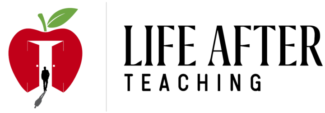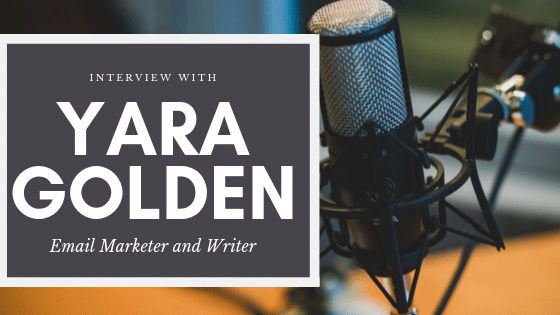
Yara Golden Interview: Email Marketer and Writer
“My Life After Teaching,” is podcast that educates, informs and inspires teachers to create a lucrative and meaningful side hustle that can lead to financial stability and freedom in 12 to 24 months. My name is Brittany Long and I’m a former science teacher turned six-figure contractor and entrepreneur, and I’m sitting down with work at home professionals who use the skills teachers already have from the classroom and discuss how they can utilize those skills to create their side hustle. If you would like to listen to the audio version of this interview, you can find it here at My Life After Teaching.
This is Brittany from, “My Life After Teaching,” and Yara Golden is here with me today. She is one of the most sought after email marketers in the industry and has worked with multiple million-plus companies. She has an incredible story and I can’t wait to share it. We’ll just hop right in and to get us started off, would you mind telling everybody a little bit about what you do?
Yara: Yeah, absolutely. I like to call myself the voice behind some of the biggest names and businesses in the online space. I’m a story-seller and I basically come in and help companies 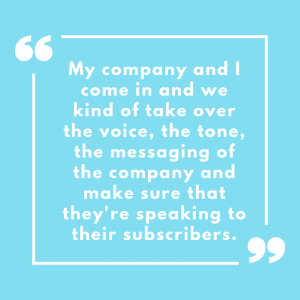 nurture their audiences. A lot of big companies will collect people’s email addresses through opt-ins, right? People who want to know more about what they’re doing. A lot of these companies don’t have the bandwidth or completely forget to talk to their audiences, right? So, I come in and I’m like, “Hey, you’ve got to build a relationship with people if you want to sell them stuff.” My company and I come in and we kind of take over the voice, the tone, the messaging of the company and make sure that they’re speaking to their subscribers.
nurture their audiences. A lot of big companies will collect people’s email addresses through opt-ins, right? People who want to know more about what they’re doing. A lot of these companies don’t have the bandwidth or completely forget to talk to their audiences, right? So, I come in and I’m like, “Hey, you’ve got to build a relationship with people if you want to sell them stuff.” My company and I come in and we kind of take over the voice, the tone, the messaging of the company and make sure that they’re speaking to their subscribers.
Awesome. Very cool. You can tell that it’s something you really enjoy. How did you get started on all of this and have you always done it or was there something that kind of pushed you into it?
There’s always something that pushes us in. Yeah. I actually got my start in the online space as a relationship coach. I was going through a divorce myself and I kind of found myself at 35-ish, I think. No, I was younger. I was like 32 years old and I was now on my own for the first time with two kids and no means of making any money. I had no marketable skills really, but I had learned so much through the process of my ex-husband and I went through to kind of disentangle our lives from each other and maintain a good relationship with each other and co-parent these kids, that I kind of took to Facebook and I just started writing. I’ve always been a writer, but it was more personal for me like journaling and things like that. So, I made my Facebook page profile public and I just kind of took to Facebook as a journal.
I was really wanting to control the narrative of what had happened because I think in a divorce, a lot of times people want to pick sides and point fingers and figure out who was right and who was wrong and who was good and who was bad. I was like, “There really wasn’t a bad guy. This was a mutual decision. It’s what’s best for us, and it was really what we believed was best for the kids.” So, I started telling that story and telling people the behind the scenes of what was going on. It seemed crazy to me, but people started reaching out to me and being like, “How are you doing this so gracefully? We want to know your secrets and will you help us? This is my story.” And I was like, “Whoa! You guys really want my help? Do you not see the disaster that I just created?” This is not good, but I quickly realized that the lessons I was learning were really, really valuable and that I was able to help other people kind of collapse time and get to that better result faster.
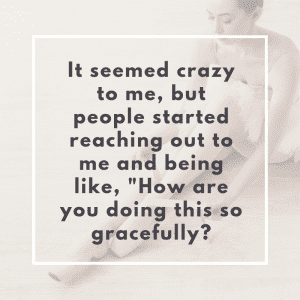 So, that’s really how it started, but the one consistent thing that I did throughout the entire time while marketing myself was writing. I was writing long form copy, I was reading and writing emotionally, engaging and captivating copy, which I thought was just words at that point. Now, I know it’s copy, and I’m a part of a couple high level masterminds and someone approached me and said, “Hey, I read everything you write. It resonates with me. I feel like I could have written it. Would you consider writing for my audience?” I was like, “I’ve never even thought about writing for somebody else. Let me give it a shot.”
So, that’s really how it started, but the one consistent thing that I did throughout the entire time while marketing myself was writing. I was writing long form copy, I was reading and writing emotionally, engaging and captivating copy, which I thought was just words at that point. Now, I know it’s copy, and I’m a part of a couple high level masterminds and someone approached me and said, “Hey, I read everything you write. It resonates with me. I feel like I could have written it. Would you consider writing for my audience?” I was like, “I’ve never even thought about writing for somebody else. Let me give it a shot.”
So I did, and her audience just completely resonated with it. They ate it up. They were kind of clamoring for more of her product and that’s really what kind of shifted and caused me to pivot from relationship coaching into more of a service based business, but the interesting thing about that is that I really deep, deep inside feel like I’m still doing the same thing, right? Before, I was helping people with a relationship one-on-one and now, I’m helping people with a relationship one too many.
Very cool. I love that. So, there are a lot of people that enjoy writing. How is just enjoying writing different than writing for somebody else? What do you need to add to what you do that’s more than just enjoying writing?
I think that’s a great question. I would say that the main difference between writing for enjoyment or for yourself, right? And writing for somebody else is that… I think especially when you’re talking about doing it for a business, we always want to speak to a prospect or a reader or a subscriber or whatever you want to call them from a place of… I hate to say authority because it’s not really like, “I’m up here and you’re down here.’ It’s more of from a place where someone would aspire to get to, right? For me, I think that that place really comes a lot from being on the other side of whatever the challenge, obstacle or issue that you’re having is. I think that a lot of times when you’re journaling for yourself or you’re getting things out on paper or you’re just kind of, I don’t know, enjoying yourself writing, it’s very introspective.
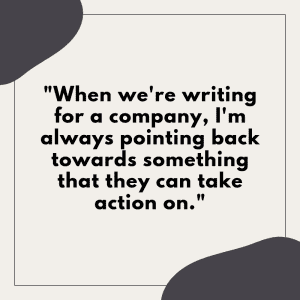 It’s an introspective process because writing really forces us to take all of these ideas and feelings and concepts that we have kind of floating around up here and jot them down in a way that makes sense and it’s in a timeline and it has an outcome, right? So, we want to make sure that we’re always taking them from this side of the bridge where they don’t understand what’s going on or the lesson that you’re going to impart to them and bring it over to this side where it’s like, “… and then this is what I learned through that process and this is how we’re going to apply it moving forward.” So, there’s always this forward direction. When we’re writing for a company, I’m always pointing back towards something that they can take action on, right? It’s like, ‘This is how we can help you do that one thing that we just told you about how we did it.”
It’s an introspective process because writing really forces us to take all of these ideas and feelings and concepts that we have kind of floating around up here and jot them down in a way that makes sense and it’s in a timeline and it has an outcome, right? So, we want to make sure that we’re always taking them from this side of the bridge where they don’t understand what’s going on or the lesson that you’re going to impart to them and bring it over to this side where it’s like, “… and then this is what I learned through that process and this is how we’re going to apply it moving forward.” So, there’s always this forward direction. When we’re writing for a company, I’m always pointing back towards something that they can take action on, right? It’s like, ‘This is how we can help you do that one thing that we just told you about how we did it.”
Okay, cool. That totally makes sense. You had mentioned that you were a relationship coach before and so what skills did you bring from that or from any other previous careers into what you do now with story selling?
Well, I think that communication is key, right? It’s a summation upon which everything is done and I think that communication really starts with yourself. It’s like; are you able to be truthful and honest with yourself about who you are, what you want, where you’re going, and how you’re occurring in your life? And then relationship is now taking that same honesty and being able to share that with somebody else and say, “Hey, I really like you. I really want you in my life, but this is who I am. This is what I want, this is where I’m going and this is what I see myself doing. Does that align?” If it does, “Awesome, let’s walk side by side.” And if it doesn’t, “That’s cool too because I understand that we’re different people and we have different values and different beliefs and different trajectories, right?”
I think when I started writing for different companies, it was the exact same thing, right? It’s just like, “Okay.” A lot of companies go out there and they’re just like, “I want to serve everybody,” right? Who’s your client? “Everyone’s my client.” And it’s like, “No, they’re not because if you serve everyone, you serve no one.” So, we have to get really, really specific about; who are the people that are really going to resonate with your message and with where you see your company going and your version and your vision of the world, right? If those people align, awesome. They’re going to opt in, they’re going to stay with you, they’re going to probably work with you, move forward at some point. If they don’t, at some point they’re going to fall off that list, right? They’re going to be like, “This person’s out of their mind,” or like, “I don’t agree with their views on this or on that.” And that’s okay too, right?
I think that that was one of the major skills. I think… Yeah. I think that it really just starts with you, right? It’s like no relationship that you have is ever going to be better than the relationship that you have with yourself. That goes for one on one relationship, and that goes for one to many relationship when we’re talking about business.
So with that relationship, with building relationships with others, building relationships with yourself, you had mentioned this time that you went through with your divorce. How did you build that relationship back within yourself because with those kinds of things, it really shifts perspective and it’s just that life changing kind of moment? So, how did you bring that back to yourself and rebuild that relationship?
No, I totally did. I totally did. I think that when we have any major changes, right? Whether you’re maybe leaving one career or you’re leaving a relationship or you’re leaving the town that you grew up in, right? There are these monumental shifts that each of us make in our lives. For some people, it’s when they go from their twenties and now it’s all of a sudden they’re 30 or all of a sudden they’re 40, and they have this, it’s almost like a persona crisis, right? Where you’re just like, “Who am I now?” I think that that was where I kind of found myself at the end of my divorce because I was like, “Well, if I’m not the stay at home mom that has a husband that takes care of everything and that doesn’t work, who am I?”
I really went through this process of finding out who I was and there’s this really messy in-between piece that no one talks about. I’m always like, “Tell them about the messy middle,” right? Because it’s like I knew who I was and I knew who I wanted to be, and there was this giant gap in the middle of it and I could see it, but I didn’t know how to get there, right? So, I had to step off of this no one over here, and I was in this middle and I was like, “Shit, I don’t know if I like Diet Coke or if I drink coffee or do I go to the gym everyday? What do I order at this restaurant?” I think I found myself a lot of times trying to please those around me and just kind of default to like, “Well, I’ll just be whoever everybody wants me to be and that’s going to be perfect,” but I had been doing that for so long that it almost was me slipping back into what was normal for me.
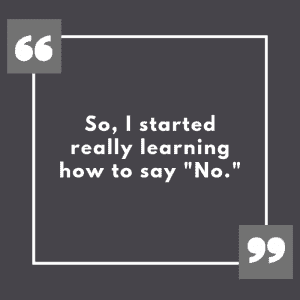 So, I had to keep pushing forward and learn how to say, “No.” I think that was really, like if I’m really, really honest, I think that that was the crux of it. I remember my mom gave me a ring and it was this really weird ring, but it could spin. I had it on my hand and it had a piece that would spin, right? And it had elephants on it. I remember she gave it to me and she’s like, “This is your, ‘No,’ ring.” I was like, “What the heck are you talking about my, ‘No,’ ring?” “Every time somebody asks you if you want to do something or if you’ll watch the…” because my ex husband and I were switching the kids back and forth. She’s like, “If you have something to do, you say, ‘No’,” and I was like, ” I don’t know how to say, ‘No.'” Yeah, she’s like, “Just spin this ring, give yourself a minute and decide if you want to say, ‘Yes,’ or you want to say, ‘No,'” I was like, “Okay, okay.”
So, I had to keep pushing forward and learn how to say, “No.” I think that was really, like if I’m really, really honest, I think that that was the crux of it. I remember my mom gave me a ring and it was this really weird ring, but it could spin. I had it on my hand and it had a piece that would spin, right? And it had elephants on it. I remember she gave it to me and she’s like, “This is your, ‘No,’ ring.” I was like, “What the heck are you talking about my, ‘No,’ ring?” “Every time somebody asks you if you want to do something or if you’ll watch the…” because my ex husband and I were switching the kids back and forth. She’s like, “If you have something to do, you say, ‘No’,” and I was like, ” I don’t know how to say, ‘No.'” Yeah, she’s like, “Just spin this ring, give yourself a minute and decide if you want to say, ‘Yes,’ or you want to say, ‘No,'” I was like, “Okay, okay.”
So, I started really learning how to say, “No.” I think in owning that, I started realizing that there was a lot of things that I was compromising in order to please others, because I was afraid, because I was uncomfortable, and I started kind of leading into that. I think slowly, but surely, I started closing the gap. I finally made it over to, who I wanted to be, who I thought I wanted to be. Then I realized that there’s another version, and you’re like, “Shit!”
I was just about to ask that. Once you got to that one place, were you like, “Wait a minute, now I want to level up again”?
Oh, 100%, 100%. That’s the journey of self-discovery and of personal development and all of that, right? It’s that you get to the peak that you’re pining after and you’re like, “I’m going to get there.” And then you get there and you’re like, “Crap, there’s another mountain that’s even higher,” but I don’t know. I think it’s fun at this point. I think I’ve just gotten used to being uncomfortable.
I get that. We have a lot of people that are teachers that listen to this. For the teachers that are like, “Okay, that’s where I am. I see who I want to be. I see that I want to be this person that works at home, builds my own schedule. I don’t know how to get there.” What would you suggest for those people who are in that spot of, “I see it. I know what I want. What now?”
Yeah. I think you got to trust yourself, you know? I think that that was one of the biggest gifts that I received from saying, “No,” and from stopping the people pleasing and from just kind of putting myself out there, right? I was in a situation where I had to. There was no money. I remember I was very much getting my self worth and my value through the things that I had, right. So, when I left the house and I got myself this three bedroom apartment with the kids, and I basically furnished the entire thing. There was not a spot in that house that didn’t have something because I took everything from the house, right? I was like, “These are my things. I have to have them with me.” I remember one day I literally was sitting at the table in the kitchen and I was looking around and I was like, “I don’t have any money to buy groceries, but here I am with this full house of this apartment full of things, but I don’t have the things that I actually need.”
I looked on the counter and I had a Vitamix sitting there and it’s like a $400 blender, right? I looked at it and I was like, “Oh my gosh. I got that at Costco, and Costco takes anything back.” I got the blender and I returned it to Costco and I got $400 and I was able to feed my kids, right? That’s where I was at. I needed to figure something out. So, I had to learn how to put myself out there and I had to become a relationship coach in the midst of a divorce when I didn’t think I was worthy or I didn’t really think that I could add value to people, but I started realizing that even if I was only two steps ahead of somebody else, I was able to help them, right? By doing that over and over and over again, I got more and more comfortable with it and I gained more and more experience. I think one of the things that we hear a lot is like, “Oh, I just want to wait until I feel comfortable and I want to wait until I have the confidence.”
I would ask you; a lot of us have been at a pool with a little kid, right? Or taught our sons and how to swim, and they can be standing at the edge of the pool wearing their little floaties looking all cute and you’re like, “Jump. It’s okay, I got you. I’m in three feet of water, nothing’s going to happen to you.” And they’re terrified, right? They’re terrified. They don’t have the confidence that when they jump, the water’s going to catch them, you’re going to catch them. All it takes is that one time for them to jump in and they’re like, “Holy crap, this is amazing.”
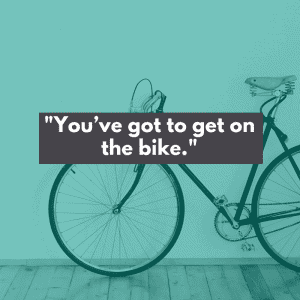 Then you stop them from jumping in, right.? So, you don’t get confidence from thinking about something. You get confidence by doing the thing. So, I had to jump in with both feet and you’re thinking about leaving a teaching position or transitioning a career, you kind of, yes, build a safety net for yourself, right? Save some money and gain some skills and go figure out what exactly it is that you want to do, but at the end of the day, you can’t learn to ride a bike at a seminar. You got to get on the bike.
Then you stop them from jumping in, right.? So, you don’t get confidence from thinking about something. You get confidence by doing the thing. So, I had to jump in with both feet and you’re thinking about leaving a teaching position or transitioning a career, you kind of, yes, build a safety net for yourself, right? Save some money and gain some skills and go figure out what exactly it is that you want to do, but at the end of the day, you can’t learn to ride a bike at a seminar. You got to get on the bike.
There’s never a perfect time, or I guess… it’s always the perfect time to start, right? It’s not a never perfect. It’s always the perfect time to start.
Exactly. We see this all the time, right? It’s like people that want to have kids, they’re like, “Oh, I’m going to wait until everything’s perfect.” And you’re like, “It’s never perfect until you’re pregnant. That’s when the time is perfect.”
Right. I really like that. I know that you have a team that you work with now. For people that are thinking, “Okay, I want to be a writer. I want to do something similar to this.” What do you usually look for when hiring somebody onto your team?
Well, okay. So, there’s a lot of marketing that goes into the writing that we do, right? Because we are promoting offers, we are promoting businesses and things like that. For me, I get a lot of applications from people that are like traditional copywriters and they’re like, “I write sales copy and I do this and I do that.” And I’m just like, “No.” I don’t want any of that. I want somebody who can bring heart and who can bring out emotions in people, and who can really take a story and pull out a lesson that makes it inspirational for the reader, right? I believe that the marketing piece of things can be taught. It can be inserted pretty easily, but I really look for somebody who understands the structure of a story, if that makes any sense.
Absolutely. For our friends that are listening that might be English teachers that teach that, that teach how to tell stories essentially with their writing, that would be something that might be a good fit for them?
Oh, absolutely. There are so many people out there that don’t know how to tell a story. They’ll get up on stage and just like word vomit. I call it story rape, where they’re just like… you’re kind of left as the audience and you’re like, “Ew. I don’t even know what to do with this. You shared way too much stuff with me.” I think one of the things that I do mostly with my clients is zoom out, right? Because they’ll get into the nitty-gritty of like, “He said, she said, and this happened, and then that happened,” and I tell them all the time, “The more detail you give somebody about your specific experience… They’re already looking for ways to disqualify themselves, so the more that you put in there, the more that they’re going to disqualify themselves.”
I like to take like a 30,000 foot view of the story and just paint in broad strokes, so that someone can identify with it easily where they’re just like, “Oh my gosh. Well, maybe my dog didn’t die, but my cat died or my hamster died. I totally remember the feeling.” Right? Because people will forget what you said and they’ll forget what you did, but they’ll always remember how you made them feel. That’s really what I’m trying to infuse into these stories is like; what is the undercurrent of the story and what’s the lesson that the protagonist took away from it? Then how can everyone collectively apply that to their lives?
Mm-hmm. That totally makes sense. So, you’ve talked about your divorce and how that was really kind of a pivotal moment for you. Since starting your business… I guess I should have asked this earlier. How long have you had your business where you have people working with you?
Well, I started in January of last year, so just a little over a year and a half. It felt like I was Wile E. Coyote strapped to a rocket for a quick second.
Wow. Yeah. That’s so wonderful. I love it. Well, congratulations. That’s great and really encouraging. Like you said, it’s good to look for people that are a few steps ahead because then it doesn’t seem quite so impossible. Yeah. For the teachers, my teacher friends or non-teacher friends too, that are watching right now; where could you be in a year from now? You know what I mean? There’s just so much
I love that this came up because with my relationship coaching business, I had some success. I had had a couple of $10,000 months, and it was up and down. I was like, “How do I make this work?” I’d really hit my head against the wall for a really long time and I was in groups where people were making tens of thousands of dollars or hundreds of thousand dollars a month. I was like, “How do you guys do that? I’m doing all the same things.” And it just wasn’t clicking for me. I was so mad and I really found myself in a lot of comparison with a lot of insecurity like, “Well, my thing isn’t as good as theirs,” or, “I don’t have as many people looking at me or watching my thing,” or, “I don’t have an audience like they do.”
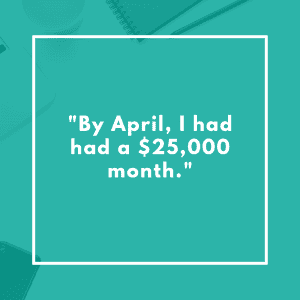 So, I was disqualifying myself every step of the way and I was comparing my wins and my results to theirs. It really wasn’t until I shifted my business and I really was doing the thing that lit me up. I can’t tell you how happy I was to just write for other people and to help other people connect with each other, and to be having this great success with results from it, right? Not even monetarily, I was just like, “This is so cool. I’m a word nerd and now I get to talk about words all day long.” That was a Funnel Hacking Live 2018, which was what? In March or February, something like that, When I finally… I started writing in January. In March I was at the event and I was like, “This is what I’m doing, you guys.” Everyone’s like, “Oh my gosh, that’s so cool.” By April, I had had a $25,000 month.
So, I was disqualifying myself every step of the way and I was comparing my wins and my results to theirs. It really wasn’t until I shifted my business and I really was doing the thing that lit me up. I can’t tell you how happy I was to just write for other people and to help other people connect with each other, and to be having this great success with results from it, right? Not even monetarily, I was just like, “This is so cool. I’m a word nerd and now I get to talk about words all day long.” That was a Funnel Hacking Live 2018, which was what? In March or February, something like that, When I finally… I started writing in January. In March I was at the event and I was like, “This is what I’m doing, you guys.” Everyone’s like, “Oh my gosh, that’s so cool.” By April, I had had a $25,000 month.
When I say I felt like Wile E. Coyote strapped to a rocket; I did because I’d never had that much money in my life. I’d been trying for so long to make it happen. Then it finally happened and I was like, “I don’t even know what to do with this right now. I have so much work. It’s coming out of my ears too.” I was doing all of the writing at that time. I was stuck to my computer all day long but I was thrilled. I guess, yes, it’s encouraging because it really can happen that fast, and I’m the one that was like, “What the hell are they doing? I need to get some of that,” but it wasn’t until I did my own thing, and really owned that and really leaned into it that it actually happened. So, yeah. It’s totally possible.
I love that. Within that year, which again is like crazy awesome, but within that year, what other obstacles did you encounter and how did you overcome them?
I think, well one of them was obviously, I couldn’t do all of the writing because I was limited at that point, right? I was like, “Well, my bandwidth can only service so many people.” So, I was like, “Well, I need to find some writers.” So, that was my first challenge like, “Okay, well how do I find writers and then how do I teach them to do what it is that I do? Can I even teach them to do what I do?” Because at that point I thought it was my gift, right? No one else can do this. It’s intuitive. I don’t know. I’m very much a creative person, so this whole idea of building out systems and processes was just completely foreign to me. Luckily, I have enough systems-oriented people around me that they were like, “Just grab a pad of paper, have it next to you, and just write it down every time you see yourself doing it more than once, write it down.”
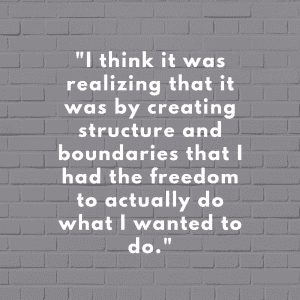 So, I created a story selling framework and it’s six steps that people can follow to kind of guide them to do this. I took 20 writers through what eventually became a writing course that I created through the framework. Then I hired most of them actually. Yeah. So, they became my team of writers. So, that was one of them. Then it was internally managing. I have clients Voxing me… Voxer is a walkie-talkie app, right? So, people are Voxing me all of these stories. So, I had to have a way to catalog them. I created a story catalog within a project management tool called Trello. That’s where I have all my stuff. I was going from being this very, very right brain, left brain? Left brain person to becoming this, like having to function in my right brain, right? I was like, “Oh my gosh, this is short-circuiting me.” But it was the only way that I could continue doing what I wanted.
So, I created a story selling framework and it’s six steps that people can follow to kind of guide them to do this. I took 20 writers through what eventually became a writing course that I created through the framework. Then I hired most of them actually. Yeah. So, they became my team of writers. So, that was one of them. Then it was internally managing. I have clients Voxing me… Voxer is a walkie-talkie app, right? So, people are Voxing me all of these stories. So, I had to have a way to catalog them. I created a story catalog within a project management tool called Trello. That’s where I have all my stuff. I was going from being this very, very right brain, left brain? Left brain person to becoming this, like having to function in my right brain, right? I was like, “Oh my gosh, this is short-circuiting me.” But it was the only way that I could continue doing what I wanted.
I think it was realizing that it was by creating structure and boundaries that I had the freedom to actually do what I wanted to do. That’s been an interesting lesson. I also got invited to speak at Funnel Hacking Live, which was this February-
Yes, I would love to hear about that and your experience with that.
Yeah. It was incredible, just so many different things. It was humbling. It was terrifying. It was an honor. It was so many things. It was really the first time that I was speaking on stage and it was in front of 4,500 people about something that I had just started doing. I was like, “This is so cool and scary and I want to throw up.” I think what was really interesting about that was that I don’t think I had… I think once you’re in personal development and you’re growing a business and you’re doing these things for as long as I have been, you become comfortable with being uncomfortable, right? And you know that you’re always learning and you’re always growing, but then there’s these moments where you feel like you’re being stretched. You get to become someone new now.
I was very aware that that was a moment for me, right? I had to go back to; who am I, what do I want, where am I going, how does this fit in, is this in alignment with me, is this really what I want to do, is this really my thing that I’m going to be speaking on? I was freaking out. I was having this freak out moment and I found a speaking coach. Her name was Gayle Larson. I reached out to her and I was just like, “Hey,” I was like, “I’m about to get on stage and I’m kind of freaking out about it. I’m super excited. I’m also freaked out.” But I think it’s less about what I’m going to say and it’s more about who I’m asking to become, like who I’m being asked to become.
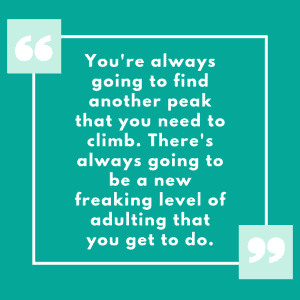 I said, ‘So, I need you to help me through that.” I think that that was a huge lesson for me in the fact that I had finally learned how to ask for help in the moment when I most needed it because I think that that’s a lot of times when we pull back and we’re just like, “No, we’re going to put our heads down and we’re going to figure it out.” I was like, “No, no, no. I know that I don’t know and I’m going to go find someone who does, so that they can help me”. I think you were there. The presentation turned out really, really well. Nobody helped me with the content. It was just the mindset piece to like, “It’s just a job, right? Just put yourself out there.” So, just like people watching may be afraid to leave the safety of the teaching environment or of what they’ve always known, I was terrified to step foot on stage, but you’re always going to be asked to jump.
I said, ‘So, I need you to help me through that.” I think that that was a huge lesson for me in the fact that I had finally learned how to ask for help in the moment when I most needed it because I think that that’s a lot of times when we pull back and we’re just like, “No, we’re going to put our heads down and we’re going to figure it out.” I was like, “No, no, no. I know that I don’t know and I’m going to go find someone who does, so that they can help me”. I think you were there. The presentation turned out really, really well. Nobody helped me with the content. It was just the mindset piece to like, “It’s just a job, right? Just put yourself out there.” So, just like people watching may be afraid to leave the safety of the teaching environment or of what they’ve always known, I was terrified to step foot on stage, but you’re always going to be asked to jump.
You’re always going to find another peak that you need to climb. There’s always going to be a new freaking level of adulting that you get to do.
Yeah, so true. I’m actually really glad that you mentioned mindset too because I wanted to talk to you about that. How has your mindset changed from day zero when you were just starting that day at Costco. How has your mindset changed from that day until now and how has that affected your business?
Oh my gosh. I’m a completely different person. I’m a completely different person and it’s funny because good old Facebook memories pop up in the morning and you see where you were five years ago, nine years ago. Now, I’m just like, “Wow. I wouldn’t wear that. I wouldn’t say that. I wouldn’t go there. I wouldn’t hang out with those people.” I think one of the biggest things for me, and this may actually be really helpful for your listeners, is the mindset piece around money. I had very much a scarcity mindset around money; there was never enough, it was always going to run out. I didn’t know where it was coming from. I didn’t really know how to create it. I was fortunate enough because of the relationship that I got into with my boyfriend James, I was surrounded by people who had a great money story and their money went like this, right? Where like my experience with money had always been like this, like feast or famine or just like plummeting.
As I was going through building my business and learning how to make offers and learning how to work with people and actually deliver on the thing that I said I was going to do for them, just this roller coaster, I would have my freak out moments where I would be in bed crying or I couldn’t buy groceries or I was like, “I want to go on that trip, but I can’t afford it.” So I made this sign. It says, “Money comes easily and frequently.”
I didn’t believe it for a second when I had that sign made. One of our friends, Trey Llewellyn, he told me, “At some point…” He’s like, “Six months down the line, your bank account isn’t going to remember that you spent $200,” or whatever it was. I don’t remember. And I was like, “I wish that I had the conviction that you have when you say that because I think my bank account remembers everything,” right? But he said this to me, “Money comes easily and frequently and that’s just a function of the value that you put out into the world and the equal value exchange that you get in return.” I was like, “That sounds fine and dandy, but I’m going to call BS,” right?
I had this made and I had it put and I put it above my desk where I could see it every single day. Year after year after year, I kept wanting it to be true and I kept looking for evidence to support the fact that that was other people’s experience of money. Slowly but surely, I started seeing how it was becoming my experience of money. Obviously, there was a lot of mindset coaching that I’ve got and that I’ve given other people for it, a lot of books that I’ve read, a lot of conferences that I’ve gone to where it got hammered into me to the point where I was like, “Okay, I relent. Maybe my story isn’t the best story and let me pick this other one up and just see how it feels.” But I think that that’s probably the biggest shift that has happened for me because without having a good relationship with money.
You’re not going to be able to sell, you’re not going to be able to collect money, you’re not going to value the thing that you’re putting out into the world, you’re not going to value your time, other people’s time. There’s so many things that go into it and you’re going not going to live in an abundant mindset, which is what all of us want, right? Now, I believe that money comes easily and frequently. It’s as readily available as the air that we breathe. None of us ever exhale and think like, “Oh my gosh. What if there’s no oxygen for me to breathe back in,” right? That energy around it would create such a different experience with every breath you took, you were freaking out about it, whereas now, when I pay my bills, I literally am just like, “I’m so grateful to the electricity company for letting me turn the lights on,” right? And I send it off. The feeling, the intention behind it, is one of gratitude rather than one of like stinginess or like not enough. I hope that’s helpful.
Yeah. Absolutely. I think, at least from my experience with teaching, I felt a lot of that scarcity mindset and I just felt like there’s no way I’m ever going to make more than $40,000 a year. When I started to shift that into, like you said, it comes abundantly. There’s plenty of it. It’s just an exchange. It became so much easier to earn more money because I was just providing a value and then they were providing value to me and it was fantastic.
Yeah. One of my coaches, because I still had a lot of difficulty around dollars and cents, and he’s like, “Here, let me just shift it for you.” He’s like, “If it’s a value exchange,” He’s like, “When you give somebody a gift at a birthday party or something, do you feel unworthy of receiving a thank you note from them?” I was like, “No. Thank you notes are awesome,” right? He’s like, “Okay, cool.” He’s like, “So, when you’re working…” He’s like, “… you’re putting value out into the world. That’s your gift and the world is going to thank you in the form of thank you notes.” I was like, “I want all of the thank you notes. Okay, cool,” right? Allow them to come. You have to feel worthy of receiving that. It’s such like a, I don’t know if I can cuss on here or not, but it’s like a mind-F, right? Because you’re like, “I want it, but I don’t feel like I’m worthy of it.
So, I keep it at arms length until I finally realize that how I’m incurring and the value that I’m providing actually has a value, a tangible value and I’m allowing that to come back to me. Then that’s the in and out,” right? That’s the waxing and waning of the moon. That’s the ebb and flow of the rivers and the oceans. It just is the way that things are.
For my science teacher friends that might be watching, it’s like the law of conservation of energy, law of conservation of mass; nothing’s created, nothing’s destroyed. It just is cyclical. Yeah, I love that. I think that’s a great way to look at it; that thank you note. I love that. Cool. One last thing- I know you have another challenge coming up. Would you mind talking about that a little bit?
Yeah, absolutely. I’m actually in the middle of it. Well, day two right now. I started the Subscriber Reviver Challenge, which is kind of my prescription for people who have those lists of emails and people that have opted into their thing and aren’t talking to them. So, I’m taking people through 15 days of how to identify what stories to tell and how to tell them and when to tell them and kind of cleaning them up a little bit and helping them get that 30,000 view perspective, so that their audience can actually resonate with it and identify with it, and really teaching them the importance of opening up that loop of communication with their people. So it’s like, “Hey, I’m not just talking at you. I actually want to have a conversation with you.” I’m super excited about it. It’s been so much work. For sure, if you ask me next year like, “What are your biggest lessons?” I’ll be like, “My challenge.” It’s a lot of fun. We had 25 spots and I sold them out and I actually got three or four stragglers that managed to wiggle their way in. I’m taking a group of about 28 people through it right now and I’m just, I’m over the moon with it.
Awesome. Are you planning on doing another one in the future and if so, how can people find out more information about it?
Yeah. I’ll probably be doing one starting June 20th, I think. You can just go to subscriberreviver.com and there’s actually an early bird opt-in so you can stay in the loop about it.
Cool. Awesome. Well, thank you so much for being here. Is there anything else you’d like to tell the teachers that are listening right now that might be on the fence about whether or not they should take that leap to try something new?
Oh my gosh. I think, first of all, thank you for being a teacher because I know I send my little hellions off to school every morning and I’m like, “Thank God for teachers.” I think that teachers are so important. They’re so undervalued in our society these days, so underpaid and I think that for the most part, there’s this incredible nurturing spirit that all of them hold. That’s something that can be parlayed into so many different things. If teaching is your passion, you can still teach, but just do it in your own way, through your own platform and with your own audience that actually resonates and allows you to do what you do at your highest capacity. I think that that would be the highest service for humanity.
Absolutely, couldn’t agree more. Awesome. Well, thank you so much for being here and thank you everybody that’s listening or watching right now for being here. Again, this is Brittany from, “My Life After Teaching,” and we’ll see you soon.
If you would like more content like this, you can find our podcast Life After Teaching on iTunes and Libsyn. Don’t forget to subscribe and share it with your friends. Visit Life After Teaching.com to learn more about ways you can start planning for your life after teaching.
